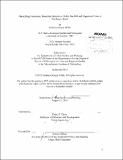The killing consensus : homicide detectives, police that kill and organized crime in São Paulo, Brazil
Author(s)
Willis, Graham Arthur Neill, 1979-
DownloadFull printable version (24.59Mb)
Alternative title
Homicide detectives, police that kill and organized crime in São Paulo, Brazil
Other Contributors
Massachusetts Institute of Technology. Department of Urban Studies and Planning.
Advisor
Diane E. Davis.
Terms of use
Metadata
Show full item recordAbstract
Policing is widely understood, empirically and theoretically, as a core function of the state. Much of the knowledge presumes that police are the only body that may kill and arbitrate killing, routinely and without retaliation from contesting parties, as a means of establishing and maintaining a legitimate legal order. This dissertation examines an urban circumstance where killing and its regulation is not simply the realm of police. Sio Paulo, Brazil is a city with parallel normative logics of killing. Via ethnographic research with homicide detectives, I examine these two logics: homicides and police killings known as resistencias. Under democratic restructuring, with failing public security and underwritten by historic and spatial inequities inscribed via disparate processes of urbanization and planning, investigations reveal the practice of a 'normal' homicide that is a product of a system of governance in the urban periphery. Killing has become the realm of an organized crime group known as the Primeiro Comando da Capital (PCC). Via a prison-periphery nexus, the PCC determines the moral borderlines of violence in the spaces it controls. In apparent moral contrast, police kill citizens at a rate of roughly one per day. Under the rubric of 'resisting arrest' there is a presumption of guilt for the dead and a presumption of innocence for the shooter. Homicide detectives investigate and arbitrate whether these presumptions are 'appropriate'. When not, a resistencia becomes a homicide and the offending police are arrested on the spot by detectives. I track the 'deservedness' of each logic and find that while the two appear antagonistic, there is often a confluence of imaginaries, coalescing in an implicit and obscured 'killing consensus'. This consensus is consolidated via co-orientation and everyday practices pointing towards mutually understood spatial and moral boundaries of who can be killed, why and where, underpinning a decline in homicides here by more than 75% since 2000. Yet, in a 2012 crisis that consensus was 'killed'. Violence erupted between police and the PCC, rupturing the everyday forms of equilibria that have given this city a false floor of security in recent years. Lastly, I examine how public debate and a modest effort to contribute to it led to contradictory reforms.
Description
Thesis (Ph. D. in Urban and Regional Studies)--Massachusetts Institute of Technology, Dept. of Urban Studies and Planning, 2013. Cataloged from PDF version of thesis. Includes bibliographical references (pages 256-277).
Date issued
2013Department
Massachusetts Institute of Technology. Department of Urban Studies and PlanningPublisher
Massachusetts Institute of Technology
Keywords
Urban Studies and Planning.